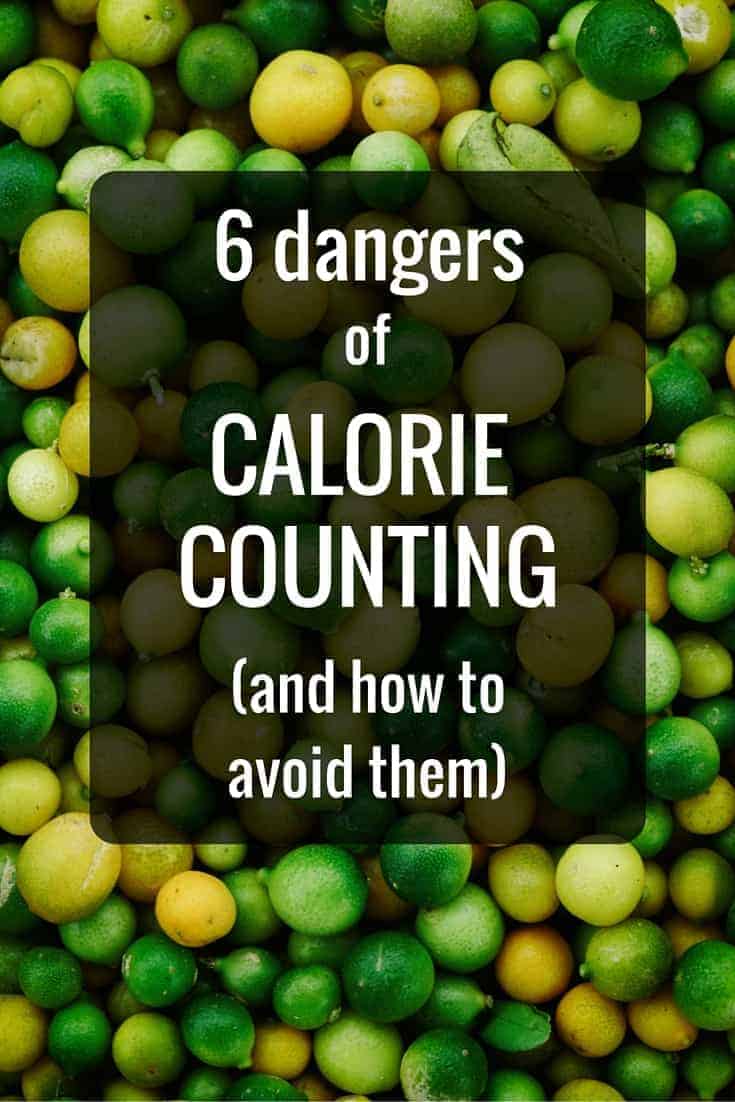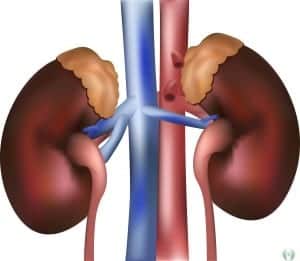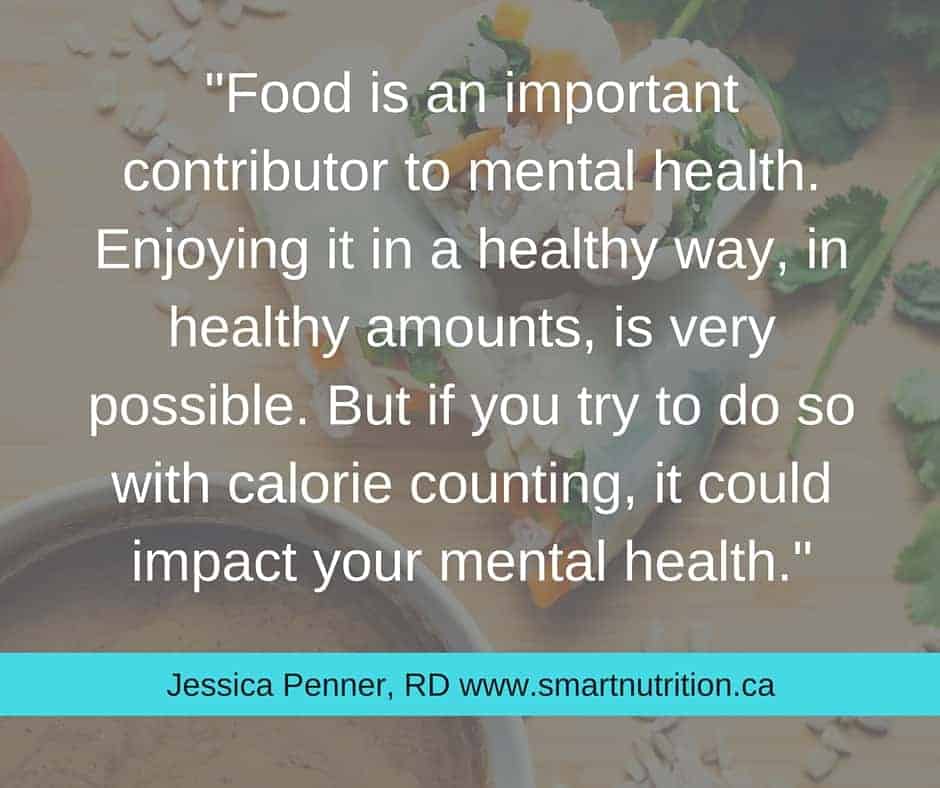
It might surprise you to hear that I, a Dietitian, am not a huge fan of calorie counting. It’s not one of my recommended techniques for managing weight.
It might also relieve you to hear this, if you’ve had a bad experience with counting calories, or you’ve been thinking about doing it!
Don’t get me wrong… some people enjoy the process of logging and calculating everything they eat and do. New technology is making this easier and more enjoyable, too. If you enjoy it, and it works for you, go ahead and do it.
But most people simply don’t have the time or patience for it. The good news is that this is totally fine… because most people will not benefit long term from counting calories. In fact, dieting behaviours like calorie counting are associated with factors like stress and lowered metabolism, which contribute to long term weight gain.
You can manage your weight successfully without counting calories. In fact, most people’s long term health and weight outcomes will improve by adopting different strategies instead.
Counting calories is a tricky technique, because it works… IF you do it reasonably accurately and IF you stick to it. Those are two big “IFs,” and the numbers show that most people don’t meet them.
Calorie Counting Can’t Be Counted On
Calorie-counters will tell you that it’s the only surefire way to lose weight, because “calories in = calories out.” They like the mathematical and concrete nature of it. They can tell when they’re doing what they need to do, and when they aren’t.
But there’s no evidence that counting calories helps people lose weight AND KEEP IT OFF. At best, it’s a short-term solution that might help people take weight off and educate them on the caloric density found in different foods.
At worst, it sabotages your relationship with food, and is associated with binge eating, yoyo dieting, a higher BMI, and lowered health indicators.
6 Dangers of Calorie Counting
Here are some specific problems inherent to counting calories.
#1: Calorie Counts Aren’t Accurate
There are all sorts of things that can throw off your count. When eating out at a restaurant, how do you know the calories there? Most problematically, people tend to underestimate the calories they’ve consumed, and overestimate their exercise.
Did you know that when you exercise over a certain amount in one day, your body starts to conserve energy so that you don’t burn too many calories? Your body limits your expended calories to a certain amount per day, essentially to make sure you don’t starve. No calorie count will be able to factor that into the calculation.
#2. Calorie Counting Isn’t Sustainable
Constantly monitoring everything you eat takes some effort. When life gets busy and stress levels rise, other things tend to take priority. Visit an online forum of calorie counters and you’ll find a lot of people who will tell you how great it is, as long as you stick to it. And they’ll talk about the importance of sticking to it, because when they’re not counting, they’re overeating. But do a poll there and you’ll be hard pressed to find many people who have done it consistently for more than a year or two.
As a sidenote: Yes, I’ve done a few informal polls of my own. It honestly makes me sad. I want to scoop up all those poor calorie counters like orphans and bring them home to a household where eating is happy and nobody needs to feel guilt for not calorie counting.
But as I was saying, you’re looking for more than a year or two of change here, aren’t you? More like lifelong change? Calorie counting is at best a short-term approach to a long-term problem. It doesn’t teach you the skills you need to eat according to your body’s needs. So, once you’re no longer counting calories, you have nothing to keep your eating under control. This is related to the following problem…
#3: Calorie Counting Is Associated With Binge Eating and Food Obsession
There are all sorts of potential reasons for the association between calorie counting and binge eating. Some health professionals consider calorie counting an eating disorder in itself.
Counting the number of calories you put in your body is like counting the number of breaths you take. It might be an indicator that something is wrong. Calorie counters tend to blame themselves for not being able to stick to obsessive behaviour. Instead I encourage them to figure out what’s really wrong that causes them to feel the need to behave obsessively.
#4: It can’t account for your body’s natural fluctuations in caloric needs
Ladies know what I’m talking about. There are times in your month when your body is working hard to burn calories that will never show up on a calorie count. You’re extra hungry this time of the month? Too bad, the chart says you’ve eaten enough. You can either go hungry and limit your body’s ability to power and heal itself, or break your diet, which could very likely end in a binge.
Menses is not the only relevant example. Changes in health or sleep habits are factors, among many others, that can contribute to fluctuations in your body’s caloric needs.
#5: It’s a restrictive lifestyle and not good for your mental health
Can you go travelling and eat the local cuisine without knowing the calorie counts? Or worse, will you end up suffering severe psychological stress from the lifestyle, like the men from this caloric restriction study?
Food should bring you joy. There are few things quite as consistent throughout humanity, crossing all races and peoples, as a natural enjoyment for food. Think of some other things that everybody enjoys. Can you imagine if we counted those in the same way? Counted the minutes of playtime with our kids? The number of seconds we kiss for?
Food is an important contributor to mental health. Enjoying it in a healthy way, in healthy amounts, is very possible. But if you try to do so with calorie counting, it could impact your mental health.
#6: It doesn’t respect your body’s signals of hunger and fullness
This is critical. Your body is an amazing, self-regulatory system that should be allowed to work as designed. Your kidneys, for example, are constantly filtering your blood. When you eat too much salt, they dump it into your urine. They’re working every second of every day to keep your body balanced.

If your kidneys stop working, you go on dialysis. An incredible machine keeps you alive by filtering your blood for you, but it can’t live up to the precision of the kidneys. Health and quality of life suffers. You have to regularly spend time hooked up to a machine that does a mediocre job of what your body used to do perfectly.
Counting calories is like hooking yourself up to a dialysis machine even though your kidneys work fine. It takes time out of your day and it does a poor job of managing weight. Unless you have a very rare disorder, you have the same hunger and fullness cues that everyone else has. Why put yourself through an ineffective and inconvenient lifestyle change, when you don’t have to?
What’s The Alternative to Calorie Counting?
Intuitive eating is one of the techniques that I guide my clients through for weight management, because it’s associated with lower BMI scores, and higher health and self-esteem indicators. It involves listening to your body’s cues, just like you did when you were an infant. Of course, by now you’re probably not used to listening to your body’s cues, but you can learn to do it again.
There’s a whole process to learning how to do this, but you can start by paying careful attention to how your body feels as you eat. Note that different foods affect you in different ways. Some keep you feeling fuller for longer. Can you identify which ones those are?
If you’d like to ditch the calorie counting and learn life-giving, freeing techniques to help you re-learn the language your body is speaking to you, then sign up for the free newsletter from my online coaching program called I Quit Overeating!
In this program I guide participants step-by-step into a healthier relationship with food. The program is based on mindful eating and intuitive eating principles, to help people rediscover the joy of eating. It teaches sustainable habit formation and uses social accountability to encourage personal growth. It’s designed from the bottom up to facilitate lasting, lifelong change.
A lot of people tell me that they count calories because it’s the only thing that works for them. But when I ask them about intuitive and mindful eating, low and behold, they haven’t heard of it. Or, they haven’t dedicated anywhere near the time and energy in order to learn how to do it.
There is a better way. You CAN set yourself free from the confines of caloric restriction, enjoy your food more, and get in touch with your body about how much is too much!
Additional References
http://psycnet.apa.org/index.cfm?fa=buy.optionToBuy&id=2007-04834-008
http://www.bodylovewellness.com/wp-content/uploads/2012/05/medicares-search-for-effective-obesity-treatments-mann-et-al.pdf
http://www.cci.health.wa.gov.au/docs/calorie%20counting.pdf
http://www.scientificamerican.com/article/science-reveals-why-calorie-counts-are-all-wrong/
https://www.psychologytoday.com/blog/evolutionary-psychiatry/201103/dieting-can-make-you-lose-your-mind
http://www.sciencedirect.com/science/article/pii/S0002822305003226
http://www.tandfonline.com/doi/abs/10.1080/19325037.2006.10598892
http://heb.sagepub.com/content/25/4/464.short
http://www.tandfonline.com/doi/abs/10.1080/19325037.2005.10608206
http://www.sciencedirect.com/science/article/pii/S019566631200400X
http://www.ncbi.nlm.nih.gov/pmc/articles/PMC2895000/
http://www.jneurosci.org/content/30/48/16399.full.pdf



Leave a Reply